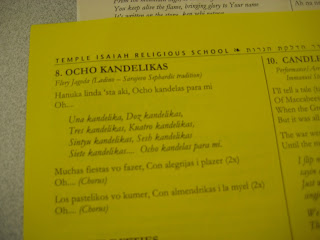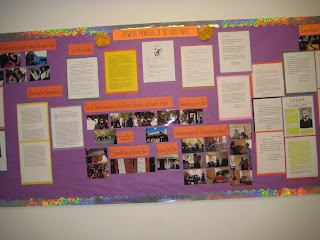We now turn our attention to the eastern European edot - the Polish and Russian Jews, most of whom belong to the Ashkenazi umbrella group of Jews in the world. I'll be sharing more detailed information about the history and culture of Ashkenazi Jewry, as we study it in class over the coming two months. Because of our very limited time in Religious School, I'll be using the holiday of Shabbat as a focus for introducing the students to the Ashkenazi culture of eastern Europe. We'll learn about their Friday evening "Kabbalat Shabbat" (greeting Sabbath) ceremony - the foods they ate, the songs and prayers they sang, the stories they told, and the Yiddish language they spoke - as we prepare to conduct our own family "Shabbat Seder" to be held on Friday evening, January 25th.
We began this unit of study yesterday by focusing on the holiday of Shabbat. We reviewed what Judaism teaches about the purpose of time and the Jewish concept of "Tikkun Olam" (repairing the world). I then shared that one of the commandments God issued to the newly formed and freed nation of Israel, after the Exodus from Egypt, was to prepare for themselves a calendar, and on that calendar to mark "special days."
We made a list on the board of what those special days were, which were specifically mentioned in the Torah - Rosh Ha'Shana, Yom Kippur, Shabbat, Sukkot, Pesach, and Shavuot - and then I asked the students which of them they believed Judaism considered to be the holiest. Yom Kippur is the holiest day on the Jewish calendar; interestingly, it is also referred to as the Shabbat Ha'Shabbatot" (the Sabbath of Sabbaths), indicating that Shabbat is considered so holy, that Yom Kippur was considered to be "Shabbat" by the Talmudic era Rabbis. In fact, Yom Kippur and Shabbat are the only two holidays which are allotted 25 hours (from sundown until the third star can be spotted in the night sky the following night).
I then introduced the class to the Hebrew grammatical concept of the "shoresh" (the root). In Hebrew, the shoresh is composed most commonly of 3 letters (sometimes 2, and occasionally 4 letters), from which words can be built. All the words built from the same shoresh have a common meaning, and it's this fact which often helps linguists understand the mentality and culture of the people speaking the language. Since the roots of the Hebrew language were developed at least 3,000 years ago (and are used even today when new words are added to accomodate our modern times), the shorashim (plural of shoresh) allow us to look back in time at how the culture and environment of the ancient Israelites influenced their language.
The first shoresh I introduced the students to was "sh-v-t" (the shin, vet, tav letters), from which the word "Shabbat" can be built. We learned that all the words that can be built from these three letters must have something to do with "rest". Shabbat is the day of rest. (La'shevet, one of the words we have learned during our "Hebrew Through Movement" lessons, means "to sit" - we rest when we sit). We discussed the meaning of resting when the question arose as to why God had to rest after 6 days of creating the universe. Our conclusion was that the understanding of what resting meant to the ancient Israelites might have been very different from our understanding of it today. We think of resting as not working, perhaps as sleeping or simply not doing what we have to do during the rest of the week. Could it be that the ancient Israelites looked upon rest as the opportunity to stand back and have the time to appreciate what they had worked on all week? When the Torah tells us that God rested on the 7th day, could it mean that God stopped creating, and took the time to appreciate Creation? ("And God saw that it was good.") We concluded our discussion with the decision that when we are told to rest on Shabbat, perhaps we are being given the opportunity to stop focusing on the details of life during the week, and take a day to "step back" and appreciate what we have accomplished, as well as what God accomplished during the six days of Creation.
We used the quarter of an hour or so that we had left before Joel came to lead us in singing songs, to fill in the dates on the Cheshvan and Kislev calendar pages, using the Hebrew letters as numerals. Students were quick to note that while the month of Tishrei was filled with one holiday after another (Rosh Ha'Shana, Yom Kippur, Sukkot, Sh'mini Atzeret, Simchat Torah and Shabbat), the month of Cheshvan had no holidays except for Shabbat. Talmudic era Rabbis actually added on "Mar" to the name of the month (Marcheshvan), to denote its lack of holidays. "Mar" in Hebrew means "bitter." Thankfully, the month of Kislev which began this past Thursday, has a very joyous historically-based holiday, beginning on the 25th of the month: Hanuka! So it wasn't surprising that Joel led us in singing some favorite Hanuka songs. And since we are the Edot class, studying the cultures of Jews all over the world, he shared with us that one of our favorite songs, "Oh Hanuka, oh Hanuka" was originally written in Yiddish (which we'll be studying following our winter break), and we sang it both in English and Yiddish. We then sang another favorite Hanuka song, this one written in the Ladino language of the Sephardi Jews - the Spanish/Portuguese Jews - called "Ocho Kandalikas" ("Eight Candles"). And we couldn't have a Hanuka song session without singing one of the more recent Hanuka songs sung by the Maccabeats, called Candlelight .
Joel shared with us that the upcoming holiday of Thanksgiving was the Pilgrim's attempt to re-create the Jewish Sukkot harvest festival. The original Thanksgiving feast was to have lasted 7 days, just like Sukkot. Unfortunately, the native Americans invited to the feast left after only 3 days and, over the centuries, the holiday evolved to the one day (and long weekend!) that we celebrate today. Interestingly, when Judah Maccabeus created a celebration for re-dedicating the Holy Temple once it was reclaimed from the Syrian Greeks, he also declared it was to be the Sukkot harvest festival celebration which they had missed celebrating in the Temple a few months prior to its recapture.
With this in mind, I'd like to wish you all a very enjoyable Thanksgiving cum "second Sukkot" holiday, and don't forget that Hanuka is not far behind (we light the first candle the evening of December 8th - less than 3 weeks from now!).
 | |
| Singing Hanuka songs, with the shoresh for Shabbat on the board behind Joel |
 | |
| Everyone sang with lots of ru'ach (spirit)! |
 |
| More ru'ach, and we haven't even learned about the Hasidim yet! |
 |
| Hebrew and Yiddish lyrics to a favorite Hanuka song |
 |
| Ladino lyrics to this Hanuka song written by Flory Jagoda |

No comments:
Post a Comment